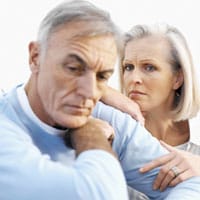When most people think of an alcoholic or drug addict, they probably don’t think of an elderly person. The term “alcoholic” typically calls to mind a skid row bum sipping from a brown paper bag under a bridge or on a park bench, or a middle-aged person staggering out of a bar. The term “drug addict” typically calls to mind a young or middle-aged adult. When you think of grandmotherly types, you probably aren’t thinking about someone guzzling bottles of wine or doubling up on pain medication. Yet there is a growing problem with substance abuse among the elderly. Older women who have spent their lives taking care of their families suddenly find themselves alone. They may be widowed with their children grown and gone, and they may turn to alcohol to ease their sense of loneliness. Senior citizens who struggle with physical pain or depression may abuse their medications seeking relief, or they may mix medication with alcohol. While drug abuse may have been unheard of among the elderly at one time, many aging baby boomers already have experience with illegal drugs. During the ’60s, use and abuse of psychedelic drugs was a way of life for many people. Those who were teenagers and young adults during that time are in their senior years now and may be in the habit of turning to substances to ease physical or psychological pain. But the effect alcohol and drugs have on people is a lot different when they reach their 60s and 70s. Older people have less tolerance for powerful chemicals because the percentage of body weight that is composed of water decreases with age. This means that alcohol and other substances will affect them more quickly than they once did. Those who live alone may eat less, which can also cause drugs or alcohol to have a bigger impact. Statistics show that more elderly men than women develop a problem with substance abuse, but more elderly women develop problems with alcohol. Substance abuse or alcohol abuse may be triggered by multiple losses, including loss of a spouse, decrease in income and development of age-related health problems. Prescriptions for medications to treat depression can increase the effects of alcohol.
Help for the Addicted Elderly
Addiction in the elderly may be overlooked both by family members and by medical professionals. Elderly patients may not be entirely honest with their doctors. At the same time, doctors are more apt to believe symptoms or personality changes are related to aging than addiction. Family members may be reluctant to confront a parent with a substance abuse problem. They may also believe that the older person is too set in his or her ways and that it is too late to change him or her. Or, family members may be puzzled as to why an elderly person is sleeping so much or undergoing personality changes, and may be unaware that alcohol or prescription drugs are being abused. The elderly may be prescribed medications for insomnia, depression, anxiety or chronic pain. If their tolerance to these medications increases, they may visit more than one doctor in an effort to increase the dosage. An elderly person who suffers from dementia or any type of confusion may make mistakes when taking prescription medications, and substance abuse may be accidental. Taking higher than prescribed doses or mixing prescription drugs with alcohol can have devastating consequences. If you suspect an elderly friend or relative may have a problem with alcohol or drugs, talk to a doctor or addiction professional. It’s never too late to get help for a substance abuse problem, and many elderly people respond just as well as young people to treatment. Recovery from drug or alcohol addiction can lead to increased alertness and a better ability to lead a healthy and independent life. Failure to get help for an addiction problem can result in overdose or other major health problems such as heart attack or stroke.

